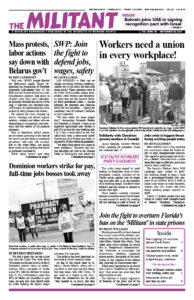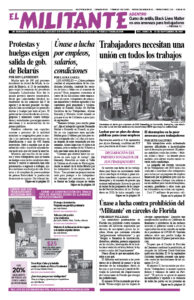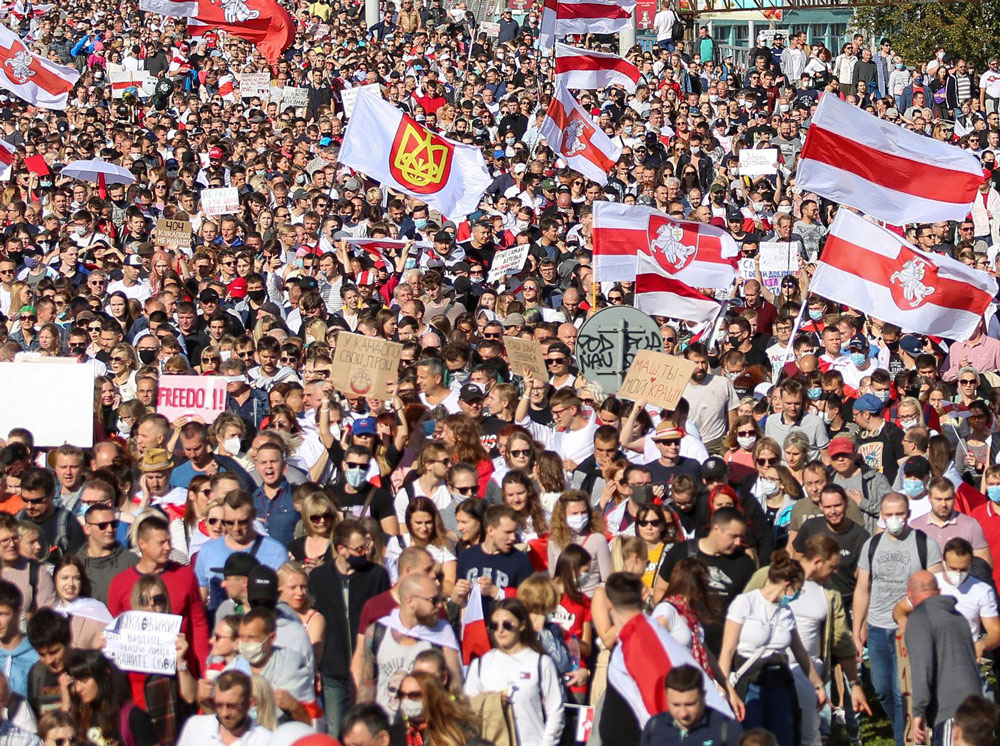Well over 100,000 people flooded the Belarusian capital Minsk demanding the resignation of President Alexander Lukashenko Sept. 13, the fifth massive Sunday protest in a row. Simultaneous protests took place in 16 other cities. Ever since Lukashenko blatantly falsified the results of the Aug. 9 elections and declared himself winner, his government has been rocked by daily protests and strikes.
His regime has been stepping up arrests, beatings and threats against workers, students and others who are demanding his resignation, new elections and the release of all political prisoners.
Men in balaclavas pulled people out of crowds gathering at the start of the march and put them in unmarked minibuses, with over 400 arrested. But as the street filled, riot police were unable to do anything but watch as protesters marched by.
While many miners and other workers who went on strike to protest the election results and repression have been pressured to return to work, thousands continue to “work to rule” to show their opposition to the regime.
Many of the 50 workers who began a political strike at Belaruskali, a huge complex of potash mines and processing works in Soligorsk, have been arrested. Thousands of fellow potash workers working to rule have slashed production. Ore output fell in August by 205,644 tons. The Minsk Regional Court has declared the actions illegal, but they continue.
Anatoly Bokun, the central leader of their strike committee, was arrested Aug. 31. Ten members of the committee have now been detained and sentenced to one or two weeks behind bars.
According to the Charter 97 website, workers from the Khimvolokno nylon and polyester plant and from the Hrodna Azot chemical company, which together have more than 13,000 workers, led the protest march in Hrodna Sept. 13. Workers at the Khimvolokno plant have also been working to rule.
At the Minsk march, along with calls for Lukashenko to resign, some carried signs saying, “The source of power in Belarus is the people, not Lukashenko and the Kremlin.” That was a reference to the meeting in Sochi, Russia, the next day between Lukashenko and Russian President Vladimir Putin. At that meeting Lukashenko secured a $1.5 billion credit line from Moscow to continue paying his security apparatus thugs.
As the International Monetary Fund had withheld an earlier loan offer, this helped stave off a financial and currency crisis for now.
Since Sept. 5 more than 1,000 people have been detained. Many have been beaten, with some posting photos of their wounds online after being released. Some reports say that 80 people are still missing.
Some 20,000 women marched in Minsk and other cities Sept. 12. Thirty were roughed up and detained during the protest in Minsk. An interior ministry press release tried to justify the violence by claiming the women shouting “shame” at the cops had engaged in “unfeminine” and “aggressive” behavior.
Moves against bourgeois opposition
Along with arrests of workers and other protesters, Lukashenko has targeted his main bourgeois opponents. All but one of the members of the Coordination Council set up on Aug. 14 by presidential candidate Svetlana Tikhanovskaya, who is widely believed to have won the election and has been forced into exile, have been arrested or fled the country. The only one who remains free is Nobel prize winning author Svetlana Alexievich, who has been joined by a number of EU representatives in her apartment.
Tikhanovskaya became the main opposition candidate after Lukashenko engineered the removal of rival candidates, including two capitalist businessmen who had been his former allies. In July, Valery Tsepkalo fled to Moscow under threat of arrest. In June, Viktor Babariko, head of Belgazprombank for 20 years before resigning to stand in the elections, was jailed on fraud and embezzlement charges.
Lukashenko has tried to strengthen his regime by cultivating ties both with capitalist governments and companies in the West and with the regime in Russia, at times irritating Putin. But in the midst of the growing opposition Lukashenko has turned to Moscow for help in maintaining his regime in power.
Moscow sees Belarus as a key buffer against NATO and Washington encroachment. Russian officials have slandered the protesters, claiming that they are working for U.S. imperialism seeking to carry out a “color revolution” aimed at undermining both the Russian and Belarusian governments.
Meanwhile, anti-government protesters in Khabarovsk, a city in Russia’s Far East, who have been demonstrating for political rights for weeks, have carried signs in support of the Belarusian people. In protests in Brest, in western Belarus, demonstrators carried a banner Sept. 13 reading, “Hello to Khabarovsk from Brest.”
Vitaly Dyadyuk, from the Belaruskali independent union strike committee, told the Militant in an email that most workers are against Moscow’s intervention just as they were against the way Putin “interfered in the internal affairs of Ukraine.”
“We don’t need any influence from either the West or the East,” he said. “We are brothers, both with Russians and Ukrainians, both with Latvians and Poles.”


